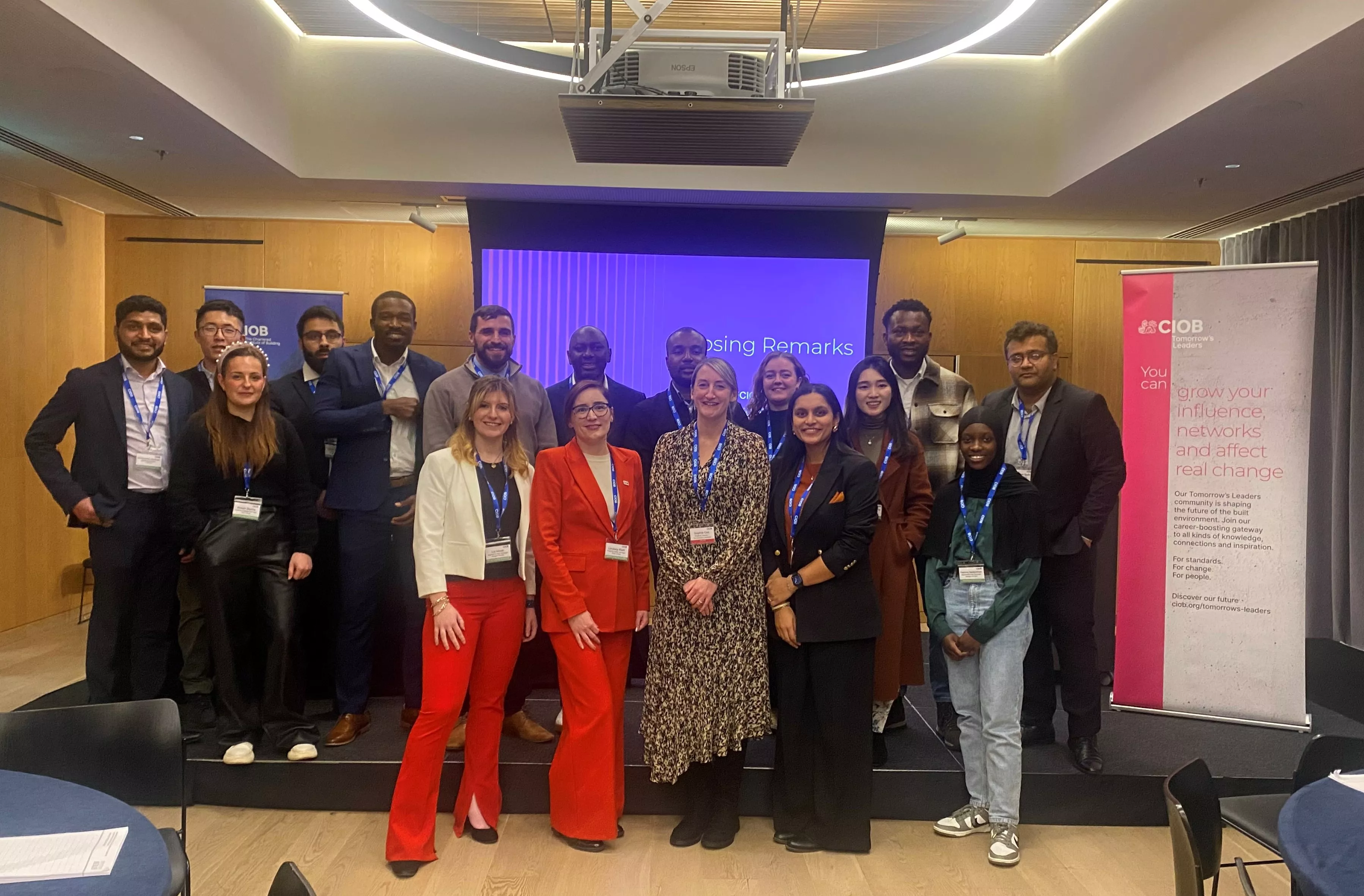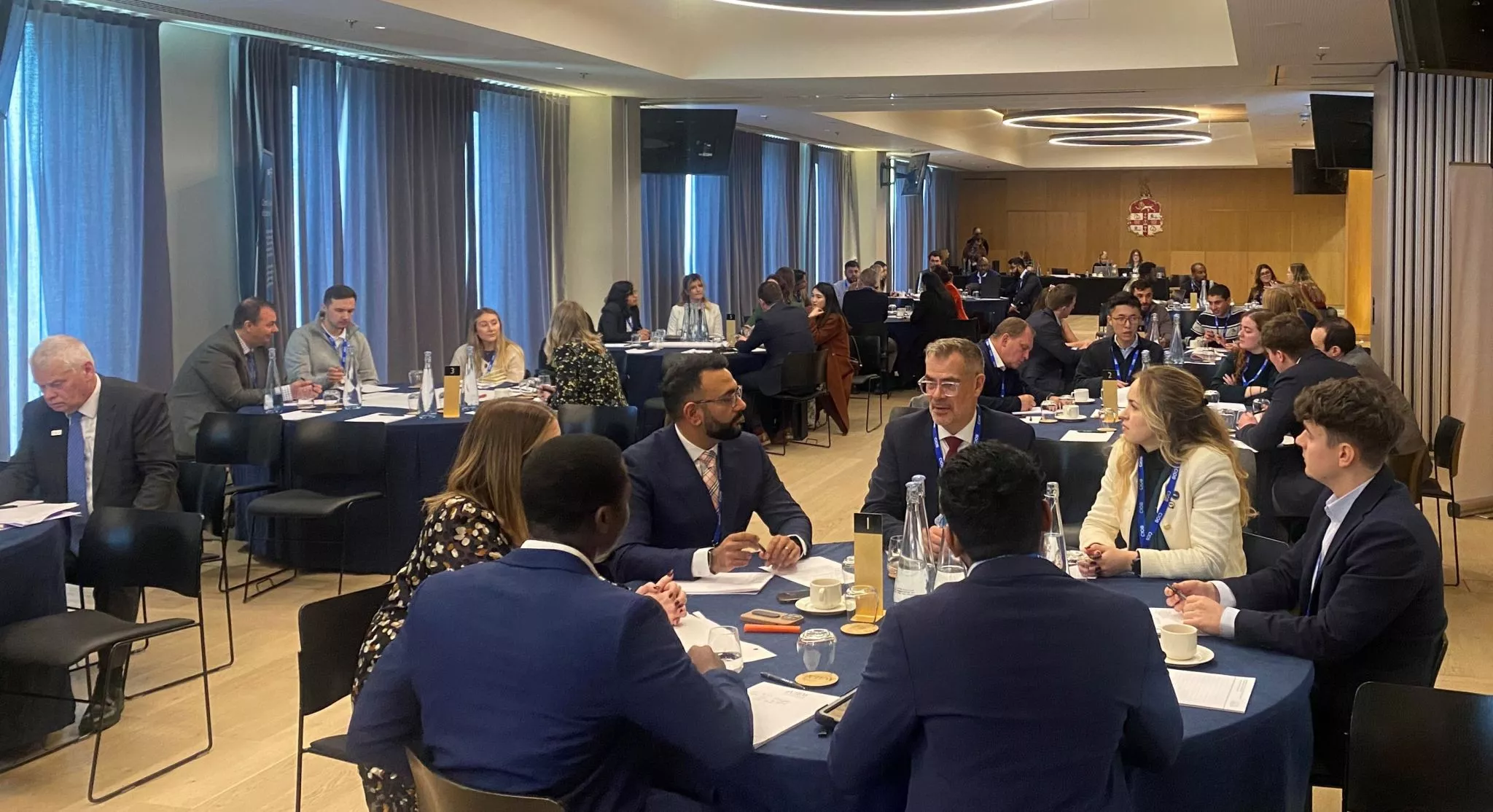
Emerging voices driving industry change
Highlighting discussions between CIOB Tomorrow’s Leaders, RICS Matrics, RTPI Young Planners and ICE.
The construction industry’s emerging leaders are highlighting ways industry professionals can collaborate to improve industry perception, strengthen early career pathways, and drive progress on sustainability and inclusion.
Kickstarting a conversation amongst future leaders, CIOB hosted an event late last year to promote cross- professional body discussion by bringing together visionary voices from early career communities across the built environment including CIOB Tomorrow’s Leaders (TL), RICS Matrics, RTPI Young Planners and ICE.
Chaired by CIOB Senior Vice President Paul Gandy FCIOB and introduced by CIOB CEO Caroline Gumble, the London event provided a platform for networking, collaboration and discussion about ways to improve the skills base both now and in the future, and the drivers needed to stimulate the market to support the government’s ambitious housing targets.
Each session began with a panel discussion, which included Anjali Pindoria, TL Representative and Senior Projects Surveyor for Avi Contracts Ltd; Joshua Waterman MCIOB, Managing Director at Building Safety Act Consult Ltd; Liz Moss TechCIOB, TL Representative and Apprentice Site Manager for Morgan Sindall; and Brian Berry, Chief Executive at Master Federation of Builders.
At the end of each panel session, delegates were given the opportunity to discuss and provide feedback. Discussion points following the event have now been collated, with outcomes identified for implementation.
Find out more
Changing the industry’s image
Improving how construction is perceived – especially among young people, parents and educators – was recognised as fundamental to attracting new talent. Delegates highlighted the importance of increasing visibility of diverse role models through storytelling, mentoring and the active use of social media.
By showcasing the variety of roles, the integration of digital tools, and the lifestyle opportunities within the sector, we can challenge outdated perceptions and inspire a new generation. Even small steps, like posting about your workday or speaking at a local school, can help shift the narrative.
However, the need to engage on a greater scale with further education providers was highlighted, as this will allow construction professionals to provide information on the career opportunities within the construction industry, and to give advice on the next steps to enter the sector.

Engaging and equipping career influencers
While parents, teachers, and employers often play a decisive role in career guidance, many lack an understanding of what a career in construction looks like today. Providing accessible resources and firsthand experiences to allow them to offer better-informed advice was identified as an important step.
Attendees recommended greater use of outreach tools such as CIOB’s Think Construction Toolkit and platforms like Go Construct, alongside efforts to encourage industry-led school visits, work experience opportunities for teachers, and careers events targeted at families.
Enhancing early career pathways
Creating more visible and supported entry points into the industry was recognised as key to building a sustainable workforce. Delegates called for increased provision of apprenticeships, internships and site visits, with a particular focus on making these opportunities accessible across different regions and education levels.
The refreshed CIOB Jobs platform, now including internships and apprenticeships, was highlighted as a practical step forward. However, there is a need for employers to use these tools to advertise positions, to showcase the range and scale of opportunities available to applicants.
Promoting real-world examples of successful career journeys can also further help normalise alternative routes into the profession and broaden appeal.
Supporting mentoring and skills development
Mentoring was recognised as a highly effective way to support both new entrants and those already in the industry. Building a culture of mentorship not only strengthens retention but also creates a sense of shared purpose and learning across generations.
Alongside this, delegates highlighted the growing need for upskilling – from leadership and business acumen to technical skills in digital tools and retrofit practices. Professional bodies and employers alike can play a role in fostering continuous learning that reflects the sector’s evolving demands.
Embedding sustainability and innovation
The journey to net zero and wider use of Modern Methods of Construction (MMC) was another central theme. Participants discussed the need to embed sustainability across education, project delivery, and everyday decision-making.
Raising awareness of MMC benefits, improving access to case studies, and encouraging carbon footprint tracking were all identified as essential next steps. While policy reform and infrastructure investment are needed, individuals can support the transition by championing innovation, sharing insights, and promoting lifecycle thinking in their organisations.
Other issues discussed included providing support to enable customer self-build, converting empty buildings, and the adoption of non-traditional building types such as timber and steel frames, and modular homes. Delegates also examined ways to improve the use of existing housing stock, such as reducing the number of empty homes, retrofitting, conversions and restoration.
Delegates also called on government to implement planning reform to ensure stability, while the roles of local government and private landlords were recognised.
Looking ahead
The event marked the start of a shared commitment across institutions to foster a more inclusive, forward-thinking, and resilient built environment. Continued collaboration between professional bodies is already underway, however achieving substantial change will require a collaborative approach between professional bodies, industry, academia and the wider government too. The ideas generated will shape future initiatives, while everyone working in the construction sector, from early-career professionals to highly experienced industry leaders can act now by mentoring a colleague, leading a site visit, sharing your story on social media or advocating for sustainability to name a few examples.
Contact our Press Office
We welcome requests for information, comments and interviews from journalists across the globe so please feel free to contact us:
